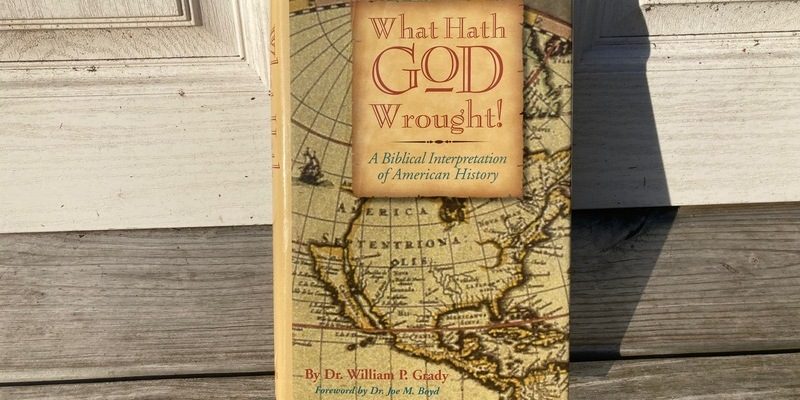Lord’s Library editors compiled this brief that offers a short summary of What Hath God Wrought, a Christian view of history by William P. Grady.
The 1996 title What Hath God Wrought explores various aspects of American history from a Christian perspective. Author William P. Grady shows the reader how principles of the Christian faith and morality were interwoven into the fabric of American society from the beginning. In this way, the birth of the United States is seen as a providential act, guided by divine intervention.
Throughout the book, Grady highlights the concept of manifest destiny, the belief that Americans had a God-ordained mission to spread the Gospel of Jesus Christ across the continent. This expansion was viewed as a manifestation of God’s plan for the nation, where Christianity played a central role in shaping the character and destiny of the United States.
Grady discusses the separation of church and state, the role of Christianity in public life, and the challenges posed by secularism. He contends that maintaining a strong Christian foundation is crucial for the nation’s moral and spiritual well-being, emphasizing the importance of preserving the Christian heritage of the United States.
Note: What Hath God Wrought is a recommended read by our editors.
What Hath God Wrought Summary
What Hath God Wrought Summary: Points to Know Before Reading
This Book Offers a Historical Defense of the Faith
What Hath God Wrought examines the Christian “fundamentalist” movement in response to theological modernism in late 19th and early 20th century America. It traces the origins of Bible-based Christianity as it attempts to halt the erosion of sound Scripture.
Fundamentalists believe in and work to uphold core Christian doctrines like the inerrancy of the Bible, the virgin birth of Christ, His deity, substitutionary atonement, and the reality of His second coming. Figures like J. Gresham Machen and John R. Rice are often mentioned as influential leaders.
Through the Concept of Biblical Innerancy
Bible-believers like Grady hold that the inerrant nature of Scripture should guide all aspects of faith and practice, and reject theological positions that compromise this doctrine. Christians typically emphasize that the Bible is not only without error but also possesses ultimate authority in all matters.
Contrasting Biblical Separation and Cultural Engagement
Christians often advocate for separatism from theological movements or institutions that depart from God’s Word in the Holy Scriptures. This separation is seen as a means of preserving doctrinal purity.
The book highlights the importance of evangelism and missions, however. And Mark 16:15 comes to mind for our editors: “And he said unto them, Go ye into all the world, and preach the gospel to every creature.” The Great Commission is central to the fundamentalist mission, and spreading the Gospel is viewed as a primary duty.
To Ultimately Explore the Concept of Manifest Destiny from the Christian Worldview
Manifest destiny was a widely held belief in the 19th century United States that the nation was destined to expand westward across the continent.
What Hath God Wrought presents the United States as a Christian nation with a divine mission to spread the Gospel of Jesus Christ as it expanded westward and beyond. In this way, it emphasized the role of Christianity in shaping the nation, and ultimately, the world, from this launchpoint.
Lord's Library is a Christian resource hub. Our editors use a variety of internet research methods like search engines, audio and video, AI, consultations with ministry leaders in the field, and more. Lord's Library should never be a substitute for reading your Bible daily as the Scriptures are to be our final authority on all matters. Lord's Library participates in affiliate programs. We may make a small commission from products purchased through this resource.
- Prosperity Gospel Meaning in the Scriptures: Is it Biblical? - April 7, 2025
- Word of Faith Movement Defined: Is it Biblical? - April 7, 2025
- Name It and Claim It Movement Meaning: Is it Biblical? - April 7, 2025














